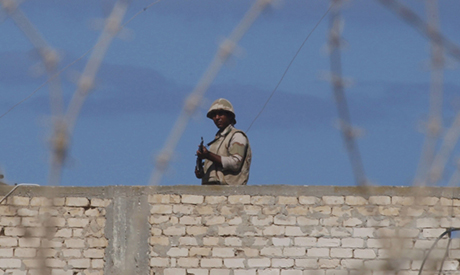Military analysts fear Syria-based militant group Islamic State could
join forces with Ansar Beit Al-Maqdis in the Sinai Peninsula

An Egyptian soldier guards the border between Egypt and southern Gaza Strip September 16, 2013
The Egyptian government is considering plans to evacuate large areas
near the border with Gaza and Israel amid fears that Syria-based
militant group Islamic State (ISIS) is now active in the Sinai Peninsula.
At least 30 members of the security forces were killed in two attacks
in North Sinai on Friday, the latest in a string of attacks on army and
police targets, prompting the government to declare a state of emergency
in the region.
What characterises Friday's attacks, and others beforehand, is their
sophistication. Militants have the ability to track army convoys and
strike causing maximum casualties.
Military and security experts told that there is no lack
of information about the militants, and dismissed the idea that the
security forces have been infiltrated by them, despite the fact that
retired military officers have been involved in some recent attacks.
“It is very difficult to imagine that there is a deficiency in the
security system as it is one of the best in the region in dealing with
this (terrorism) file. However, there is always a chance for human
errors on the ground,” said Major General Sameh Seif El-Yazal, an
expert in national security affairs.
Although there was no immediate claim of responsibility for the
attacks, Ansar Beit Al-Maqdis, an Al-Qaeda-inspired militant group, has
claimed responsibility for similar attacks.
Local observers and
security experts believe it was behind Friday's assaults and that it
has links with Islamic State.
“Many see the 24 October attack as a preliminary message that IS
exists in Egypt, especially after its recent message to its “brothers”
in Sinai telling them not to move to the lands of jihad in Syria and
Iraq but rather to stay and support Ansar Beit Al-Maqdis, which will
soon be IS's Egyptian front,” Ghazi Abu Farrag, a local researcher,
told . “We have been warning for months that IS is emerging
in Sinai, whether under the umbrella of Ansar Beit Al-Maqdis or
another group.”
Leading Islamist militant Adel Habara, who has been sentenced to death
for involvement in deadly attacks on soldiers, recently told a local
media outlet that “ISIS is coming to Egypt.”
A local source in Sinai, who preferred to remain anonymous, told Ahram
Online that the flow of money to recruit young people to militant
groups is “not a big problem for them, and it is almost impossible to
keep track of these funds.”
The source hinted that some of this money comes indirectly through
networks in both Israel and Gaza. “Until this moment Ansar Beit
Al-Maqdis does not seem to have a problem with getting money, whether
through these financial networks or through trafficking or arms
trading,” he added.
Communication also does not seem to be a problem, the source added.
“They are not using local communication networks but mostly networks
associated with the Thuraya satellite phone. Some use Palestinian
networks or even Israeli ones. Even more, some have started using
private networks with coverage of up to 120km, which are hard to trace
with conventional [tracking] methods.”
The army's next move On the ground, Sameh Seif Yazal, director of the Republic Center for
Strategic and Security Studies, said an 8km area parallel to the border
with the Gaza Strip should be evacuated of civilians and pronounced a
military operation zone.
This idea seems to be a possibility, especially after the spokesperson
of the Egyptian cabinet Hossam El-Qawish told media on Saturday night
that if such measurements were taken they would only include limited
areas and be for a limited period of time.
"The government has taken a
decision to allocate the necessary funds to move the citizens from areas
where military operations are expected to be undertaken," El-Qawish
told CBC-Extra private television channel.
Local journalist Ashraf Sweilam told Ahram Online that some tribal
leaders in Sheikh Zuweid had expressed their enthusiasm for the idea
because “they are tired of militant attacks in the area which have left
them almost paralysed.”
Yet military expert Alaa Ezz-Eddin does not think evacuation will be
an easy task. “If it does this, Egypt will losing one of its most
important sources of information [the tribesmen] and this is something
we need to consider when taking such a decision or at least look into
alternatives,” he said.
Tribesmen in the area are one of most qualified sources of information about local militants, he added.
“Yes the tribesmen are sources of information,” Abu Farrag told Ahram
Online, “but we should also bear in mind that it is getting harder for
them as Ansar Beit Al-Maqdis punishes anyone they suspect of having
connections with the police or military.”
According to local sources, Ansar Beit Al-Maqdis warn anyone who deals
with the army to leave the area within a week or they will be
decapitated.
“Some families have already moved to the Nile Delta for this reason,” said Abu Farrag.
“Evacuation is a hard choice for the people of Sinai, who have had a
bitter history since the 1967 war with Israel,” Abu Farrag added. “And
even if the government has a plan to compensate the temporary
evacuatees it has to keep in mind that the people of Sinai are very
attached to their land and will not leave it easily, even for better
places.”
Abu Farrag and other tribal sources told that jihadist
militants are now in control of some areas and are even supported by
local residents who help them find their way to safe places in the
desert.

No comments:
Post a Comment
Note: Only a member of this blog may post a comment.